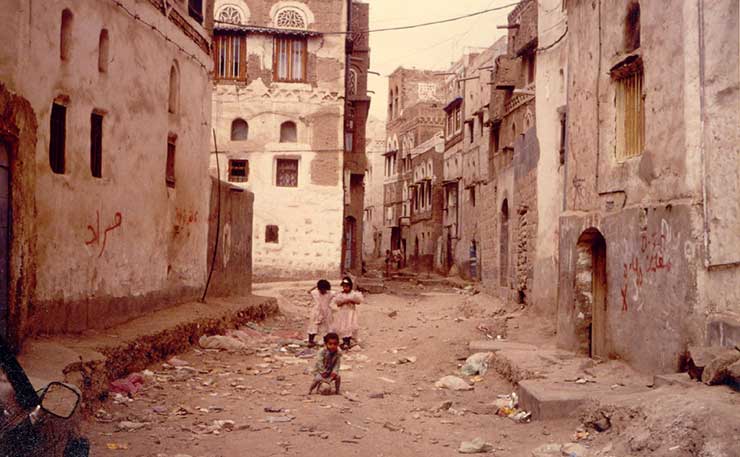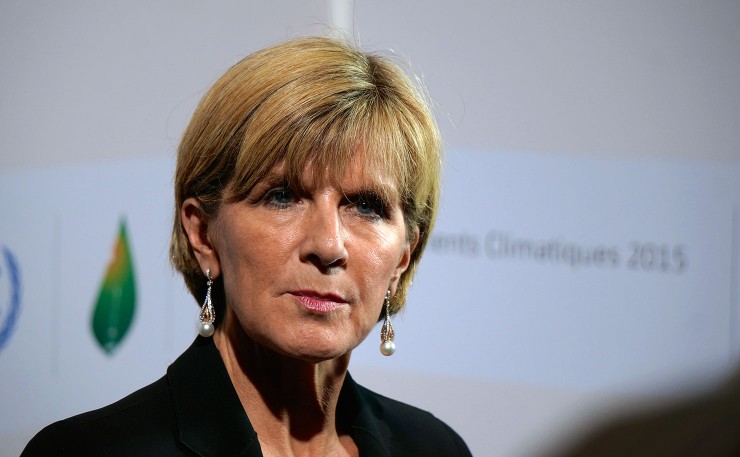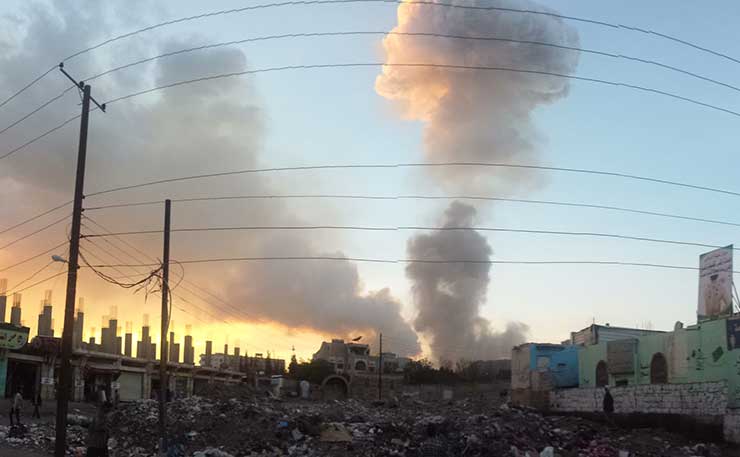While Australia jails people who assist the war in Syria, we turn a blind eye to Australians fighting in nearby Yemen. Michael Brull explains the extraordinary double standard.
There are good reasons why we should pay more attention to the war in Yemen.
Firstly, it is a major atrocity, and leaving a nation utterly devastated. Secondly, the war depends crucially on Western support. Thirdly, the Australian government has helped propagate the war, by publicly legitimising it, and then maintaining a prolonged silence. Fourthly, Australian mercenaries have been deeply involved in one of the armies that has invaded Yemen.
Whilst Australia punishes foreign fighters in Syria, we have barely applied any scrutiny to the mercenaries helping the Saudi-led coalition devastate Yemen.
The US-Saudi war on Yemen is destroying it
In March, Yemeni journalist Nasser Arrabyee observed the destruction caused by the war, with “particular damage to infrastructure — including reservoirs, airports, electric power stations, bridges and roads, markets, factories, stadiums, and hospitals. The education sector has been hit especially hard, with 39 universities damaged, 810 primary and secondary schools damaged, and another 3,809 closed. About 85 percent of the population of 27 million is in dire need of food, water, medicine, and fuel. Over 2.5 million Yemenis are displaced, and the attacks have killed or injured more than 23,000 civilians”.
Patrick Cockburn reported in April that, “Since the UN says that 14.1 million Yemenis, 54 per cent of the population, have no access to health care, this is likely to be an underestimate. Even before the war, Yemen was the poorest Arab nation and its people are now starving or malnourished. OXFAM estimates that 82 per cent of Yemen’s 21 million population are in need of humanitarian assistance.”
The war on Yemen has been primarily fought by a coalition of Arab countries, led by Saudi Arabia. The UN’s latest estimate is that at least 10 000 people have been killed in Yemen.
The UN previously estimated that the war has killed some 3,799 people. It estimates that Saudi coalition air-strikes are responsible for some 60 percent of deaths.
A New York Times editorial observed in August the war has “pushed one of the world’s poorest countries from deprivation to devastation”.
Importantly, this war could not be fought without crucial US backing. As the NYT explained, “Obama agreed to support the Yemen intervention — without formal authorization from Congress — and sell the Saudis even more weapons in part to appease Riyadh’s anger over the Iran nuclear deal. All told, since taking office, Mr Obama has sold the Saudis $110 billion in arms, including Apache helicopters and missiles. Mr Obama has also supplied the coalition such indispensable assistance as intelligence, in-flight refuelling of aircraft and help in identifying appropriate targets. Experts say the coalition would be grounded if Washington withheld its support.”
That support continued in August: “The State Department last week approved the potential sale of $1.15 billion more in tanks and other equipment to Saudi Arabia to replace items destroyed in the war.”
A brief guide to the war
The war is complex, so I will try to briefly sketch some of the context. For decades, the ruler of Yemen was a dictator called Ali Abdullah Saleh. Like other Arab countries, there was an uprising against Saleh in 2011 by the people of Yemen.
Like many other dictators in the region, Saleh was a favourite of the West. Saleh supported the US drone assassination program, and pretended “the bombs are ours, not yours.” He also collaborated in the imprisonment of a journalist called Abdulelah Haider Shaye, who exposed a US drone strike that killed dozens of innocent people.
As it didn’t look like the Yemeni uprising could be suppressed, the regime found a Plan B. Dan Murphy at the Christian Science Monitor explained: “The Saudis, with America’s blessing, concocted a transition plan that saw his vice president, Mr [‘Abd Rabbu Mansour] Hadi, elevated to the big seat. The 2012 deal gave Saleh immunity from prosecution for corruption and abuses of state power”. That Saudi plan came under the rubric of the Gulf Cooperation Council (GCC), a coalition of six wealthy Arab countries.
The US-Saudi-GCC plan included an election, where Hadi was the only candidate allowed. After winning 99.6 percent of the vote, “Saudi and the US insist that only Hadi is the legitimate ruler of Yemen”. This was acclaimed as a democratic transition by the West, which proceeded to denounce opponents of this process as opposed to the democratic process.
Stacey Philbrick Yadav and Sheila Carapico, two academic specialists on Yemen, discuss the Houthi rebellion at MERIP. They explain that, “The Houthis and other dissidents maintained that the GCC initiative sought to demobilize the mass 2011 revolutionary uprising by sanctifying an elite pact between members of the Saleh regime and its formal, multi-party, cross-ideological ‘loyal’ parliamentary opposition, the Joint Meeting Parties alliance, or Mushtarak. The Mushtarak, in turn, was dominated by a conservative northern alliance”.

Meanwhile, the transitional governing coalition excluded “both the Houthis and the Southern Movement”.
The Houthis proceeded to take up arms against the Saudi-backed order imposed on Yemen. In September 2014, the Houthis captured Sanaa, the capital of Yemen, in coalition with the previously deposed dictator of Yemen, Saleh.
Yadav and Carapico argue that, “the Houthis walked into Sanaa largely unopposed, mainly because people were fed up with the GCC’s repackaging of the ancient regime, and secondarily for primordial reasons (because Sanaa remains a largely Zaydi city where historically prominent local families are – like the Houthis – sayyids, or direct descendants of the Prophet).”
As the Houthi-Saleh alliance advanced in March 2015, the Hadi government fled from Yemen to Saudi Arabia. The Saudis proceeded to lead the bombing campaign against Yemen. The Hadi government in exile and the Saudis claim that the Houthis are a proxy for Iran. Thus, Iran is the real aggressor in Yemen, whilst the GCC is merely protecting its legitimate government.
Whilst Iran does provide some support for the Houthis, the nature of this relationship is often overstated. A 2009 Wikileaks cable comments that “Contrary to [Yemeni government] claims that Iran is arming the Houthis, most analysts report that the Houthis obtain their weapons from the Yemeni black market and even from the ROYG military itself.”
The Saudi war has also been backed by the Security Council, in particular by the US, France and the United Kingdom. The Security Council has imposed sanctions on the Houthis, whilst recognising the “legitimate government” as that imposed by the GCC initiative. That is, the process that installed Hadi through an election with him as the only candidate, where he won over 99 percent of the vote.
Sanctions against “those threatening stability in Yemen” were expanded by the Security Council this year. They did not include the Saudi-led coalition, or their crucial Western backers.
Aside from the devastating effect on the people of Yemen, there has been another ominous by-product of the war. That is, the rise of al Qaeda in the Arabian Peninsula (AQAP).
Bill Hess noted that “the past year of excessive bombing has benefitted AQAP by crippling or distracting its enemies and weakening the Yemeni state”. This is because of “the Saudi-led campaign’s almost exclusive focus on the Houthi-Saleh alliance.”
In April 2015, AQAP “occupied Mukalla, Yemen’s fifth-largest city and the capital of Yemen’s largest province, freeing prisoners and seizing cash and weapons. In December it captured Zinzibar, the capital of Abyan province, and in late January, the capital of Lahj province, Houta, also fell to the group. In February AQAP occupied several more towns as it is now quickly re-establishing control over the territory it held at its prior peak in 2011 and 2012. As busy as AQAP has been, it still took the time to reaffirm in August 2015 that the United States remains its top target.”
Patrick Cockburn similarly reported that AQAP has created its “own mini-state. This now stretches for 340 miles – longer than the distance from London to Edinburgh – along the south coast of Yemen. AQAP, which the CIA once described as the most dangerous protagonist of ‘global jihad’ in the world, today has an organised administration with its own tax revenues.”
Australia supports Saudi hegemony over Yemen
In short, the war on Yemen is an utter disaster. Though Australia traditionally has had a strong relationship with Saudi Arabia, our Foreign Minister has hardly commented on the war.
In February 2015, Julie Bishop issued her first media release on the conflict, expressing concern about the “Houthi Shia militia” conquering Sanaa. She did not explain the significance of the sectarian identification of the Houthis.
Bishop welcomed the adoption of Security Council Resolution which condemned the Houthis, and praised the GCC and the GCC initiative. She urged “all parties to cease armed hostilities and to continue the political transition process”. That is, the Saudi-GCC-US imposed government of the former dictator’s vice-president.
On April 12, 2015 Bishop issued her second and last media release on the war in Yemen. Not entirely coherent, it praises the “important role the GCC has played in assisting Yemen in recent years”, whilst also urging “all combatants” to “establish a cease-fire”.

Signalling support for the Saudi position, Bishop wrote that “Australia recognises the legitimacy of the government of President Hadi and calls upon the Houthis to return to the negotiating table.” She also “recognises the legitimate interests of Yemen’s neighbours in maintaining regional security”.
As for the Saudi-led invasion, Bishop commented: “We note President Hadi’s request for protection and the military action taken in response by Saudi Arabia.”
Whilst Bishop didn’t quite praise the invasion, she recognised the “legitimate interests” of “Yemen’s neighbours” in “maintaining regional security”. Whatever that means, Yemen’s neighbours are Saudi Arabia and Oman. As Bishop also recognises the “legitimacy” of the Hadi government, living in exile in Saudi Arabia, Bishop supports both the Saudi right to intervene, and the cause for which it is intervening. Though if anyone wonders about her humanity, Bishop “is particularly concerned about the welfare of civilians caught up in the fighting and calls upon armed groups to show restraint”. I’m sure Yemenis are deeply moved by her heartfelt concern.
The Department of Foreign Affairs has also imposed sanctions, in line with Security Council Resolution 2216. Criteria for having sanctions applied include Obstructing or undermining the successful completion of the political transition, as outlined in the Gulf Cooperation Council (GCC) Initiative”. That is, they are targeted at the Houthi-Saleh alliance, not the Saudi-led invaders.
The Australian mercenaries in Yemen
What has mostly passed without controversy is that Australian fighters have gone to fight for the Saudi’s in their war on Yemen. An Australian mercenary, reportedly Philip Stitman, died in the war in December last year. He was part of a group of mercenaries, formerly known as Blackwater, employed and sent by the United Arab Emirates to wage war on Yemen.
Later in December, Middle East Eye revealed that the leader of the UAE force of mercenaries was a former Australian major-general called Mike Hindmarsh. He created the military formation, known as the Presidential Guard, in 2010, earning perhaps $500,000 a year for his work. Rori Donaghy estimated that Hindmarsh commands some 5,000 soldiers, including 1,500 currently fighting in Yemen.
He also reported that “one Gulf official told Middle East Eye on condition of anonymity that the external ground forces were in reality being steered by the UAE”. That is, by the forces commanded by Hindmarsh.
It is not just Hindmarsh involved in the war. Donaghy found “numerous results of experienced soldiers – mainly from Australia – who occupy senior roles in the elite force. Among those working in Abu Dhabi is Peter Butson, a former Australian soldier and intelligence corps officer who since February 2014 has been an adviser to the Presidential Guard. Scott Corrigan, a former special operations commander in the Australian army, has been a specialist adviser to the Presidential Guard since January 2013. Kevin Dolan is an evaluator for the guard and was previously a warrant officer in both the Australian and British armies. Steve Nichols is another former senior commander in the Australian army who is now in his fifth year as a senior adviser to the guards.”
The Herald Sun reported in 2009 that, “Dozens of ex-Australian soldiers work for the UAE military in leadership, training and mentoring roles, developing links between the two armed forces”.
In February, Sophie McNeill offered an important report on Hindmarsh’s role in Yemen. Otherwise, there has been vanishingly little scrutiny of Australia’s foreign fighters in Yemen.
A few weeks ago, Hamdi Alqudsi was sentenced to six years in prison without parole for helping Australians fight for extremist terrorist groups in Syria. In her sentencing remarks, Justice Christine Adamson observed that, “it does not matter who they were fighting for or against”. This is because the “purpose” of the legislation “is to deter and prevent foreign fighters from engaging in armed hostilities in foreign States and to punish those who go, and those who assist them”.
Why shouldn’t we deter and prevent people from fighting in Yemen? Why shouldn’t we punish those who do? If it’s not okay to fight in a foreign war for ideological reasons, why is it okay to fight in a foreign war for money?
It’s true that groups like Jabhat al Nusra, Ahrar al Sham and ISIS have committed terrible atrocities. Yet if our concern is preventing Australians from committing atrocities overseas, then why is it okay for Australians to fight in the war that is currently destroying Yemen?
Donate To New Matilda
New Matilda is a small, independent media outlet. We survive through reader contributions, and never losing a lawsuit. If you got something from this article, giving something back helps us to continue speaking truth to power. Every little bit counts.





